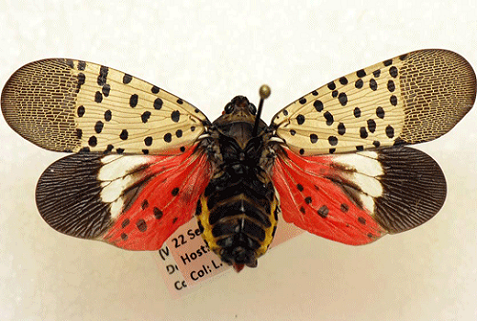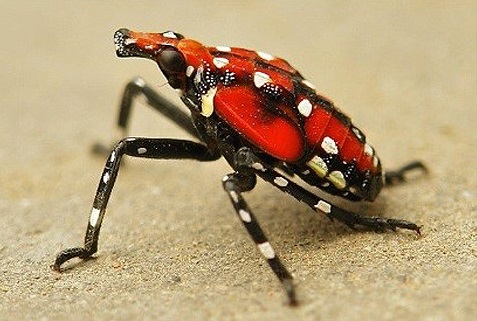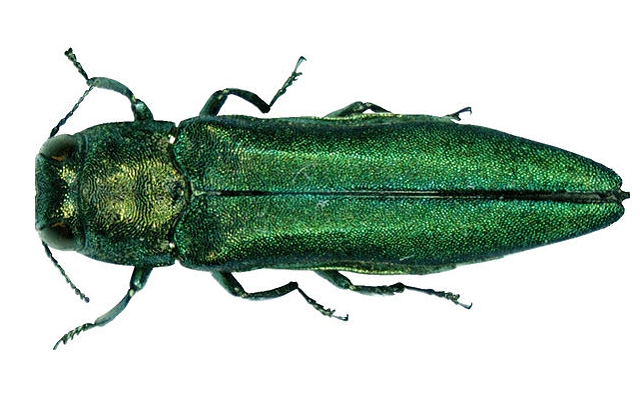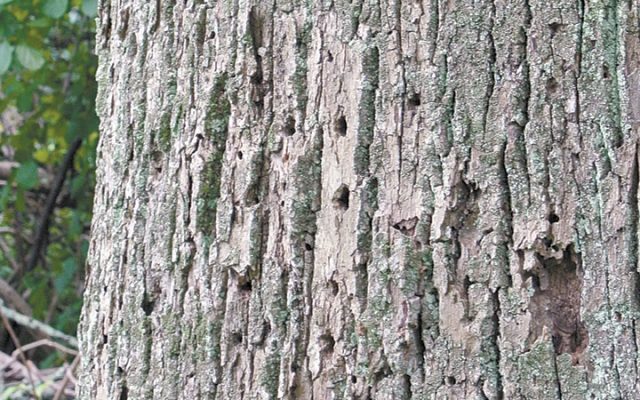Pest Alert
Invasive Pests New to Berks County
Spotted Lanternfly
The Spotted Lanternfly (Lycorma delicatula) is native to China and was first detected in Pennsylvania in September 2014. Spotted lanternfly feeds on a wide range of fruit, ornamental and woody trees, with tree-of-heaven being one of the preferred hosts. Spotted lanternflies are invasive and can be spread long distances by people who move infested material or items containing egg masses. If allowed to spread in the United States, this pest could seriously impact the country’s grape, orchard, and logging industries.


Emerald Ash Borer
The Emerald Ash Borer (Agrilus planipennis or EAB) is responsible for the destruction of tens of millions of ash trees in 30 states. Native to Asia, it likely arrived in the United States hidden in wood packing materials. The first U.S. identification of Emerald Ash Borer was in southeastern Michigan in 2002. There are a variety of treatment options that can serve as a control measure for the EAB, but they are not a cure.


Common Pests of Pennsylvania Trees and Shrubs
Spruce Spider Mite
The spruce spider mite is considered one of the most destructive spider mites in the United States. It injures the foliage of spruce, arborvitae, juniper, hemlock, pine, Douglas-fir, and occasionally other conifers.
Bagworms
The bagworm is a perennial insect pest of arborvitae, juniper, pine, spruce, and many other evergreen species. This insect is most easily recognized by the case or bag that the caterpillar forms and suspends from ornamental plants on which it feeds.
Japanese Beetles
The Japanese beetle causes extensive damage to ornamental trees, shrubs, and flowers throughout eastern United States. In Pennsylvania adults start to appear in late June. Beetles are most abundant during July and the first two weeks of August.
Hemlock Woolly Adelgid
This is a significant pest of Eastern Hemlock trees in Pennsylvania. The most obvious sign of an infestation are filaments of wax produced by females. These cottony masses normally persist even after treatments have killed the pest. Treatments can be applied at various times throughout the year when the insets are vulnerable.
Scale Insects
Scale insects can be either soft are hard bodied insects. They damage a variety of trees and shrubs by sucking sap from the plant. Often the first sign of an infestation is a sticky substance called honeydew secreted by the pest and found on leaves and stems of the infected plant. It is common to find sooty mold growing on the sticky substrate.
Gypsy Moth
The gypsy moth, was accidentally introduced into Massachusetts in l869.This pest is indirectly responsible for causing mortality of susceptible host trees. Heavy defoliation by the larval stage of this pest causes stress to infested host plants. It is the most important insect pest of forest and shade trees in the eastern United States.
Mimosa Webworm
The mimosa webworm feeds primarily on the leaves of mimosa and honeylocust trees. There are two generations per year, early to mid June and again in August and September
Fall Webworm
The fall webworm is a widely distributed native pest of shade trees and shrubs and appears from late summer through early fall. It feeds on almost 90 species of deciduous trees commonly attacking hickory, walnut, birch, cherry, and crabapple.
Eastern Tent Caterpillar
The preferred hosts of this pest are cherry, crabapple, and apple. The eastern tent caterpillar occasionally attacks other deciduous ornamental shrubs, shade, and forest trees.
Lacebug
Pieris, Rhododendron and Azalea shrubs are commonly affected by this pest. Both adults and nymphs injure the host by piercing the epidermis of a leaf and sucking fluid from plant tissue. The removal of plant juices causes foliar discoloration, reduced plant vigor, and premature leaf drop. Lace bugs can be found in all stages of development on broad-leaved evergreens until August or September.
Learn More

Please fill out the form below with any questions.